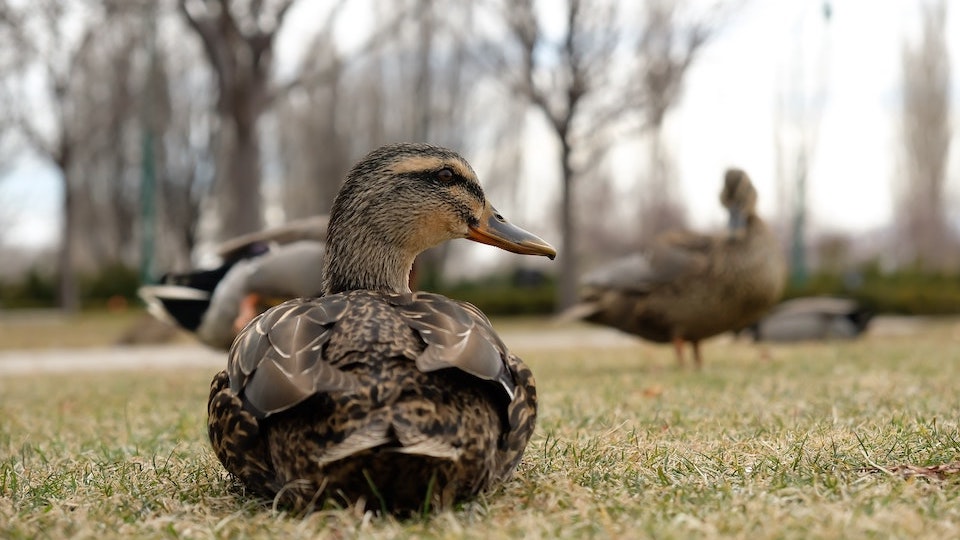Chickens are great; they are easy to keep, provide loads of delicious eggs, and are super fun to watch. There have been times in my past, where I have pulled up a lawn chair and literally watched my chickens for hours. But lately, I have come to appreciate just how great ducks are, especially when it comes to natural pest control. If you have been thinking about getting ducks but are on the fence, let me help you. Here are some great reasons to invest in these happy fowl.
Ducks produce awesome eggs
If you take a trip to your local farmer’s market, you may find someone selling duck eggs. These rich and delicious gems will fetch twice the price of chicken eggs. Not only are duck eggs large, about three times the size of the average chicken egg, they also have a thick yolk and are a favorite for pasta makers and bakers alike. Whether you plan to sell duck eggs or not, they are a great source of protein, and when used in baking, just make everything fluffier and tastier.
Ducks are easy to keep
Contrary to what you may have heard, ducks are really easy keepers. Ducks require a safe shelter at night and a fenced area unless you are going to free-range. They like access to fresh grass and enjoy a scoop or two of duck feed as a supplement. Of course, fresh and clean water is a must for both bathing and drinking. They love enough water to wade in and splash around to get clean.
Ducks are great natural weed and pest control
Ducks love pests of many kinds, including slugs and worms. They can be very helpful in keeping tomato hornworms out of your garden as well. Let your ducks loose in areas where you need some weeding done, and you will be quite surprised with how quickly they can mow down an area for you.
Ducks will keep small predators at bay
Ducks are not only bigger than chickens, but they can also be sassy, picking a fight with any small predator that advances or threatens the hens or chicks. Putting a few ducks in with your chickens will help protect them from small rodents such as weasels and rats. In fact, ducks have been known to kill mice and gobble them up for lunch!
Ducks are the ultimate entertainers
If you think chickens are fun to watch, you need to spend some time with a few ducks. If you raise ducks from the time they are little, you will be amazed at how they imprint and bond to you, following you around and chattering all the way.
Tips for keeping ducks healthy and happy
Water, water, and more water
As mentioned above, ducks love water to splash around in and keep them clean. One of the best things you can do for your ducks to keep them healthy and happy is to provide them with an unlimited supply of clean water. Ducks need water to digest food, and they need to be able to dunk their head down into the water to clean their nostrils and keep their eyes clean. They need to be able to preen in the water to activate the oil gland at the base of their tail. Adult ducks can drink about 4 cups of water a day. Be sure that you are always providing enough fresh and clean water. Keep an eye on any water source that you provide for your ducks as they will dirty it quite quickly by climbing in it and tossing food and dirt into it. Use vinegar and a stiff brush to keep water bowls as clean as possible for your ducks.
If you can provide them with a pool for swimming, they will love it! Any small, kids pool will do the trick. Be sure to dump, clean, and refill the pool every couple of days. Vinegar and a scrub brush works well and will also keep algae at bay.
High-quality feed and supplements
Adult ducks can eat chicken or mixed flock layer feed. One pair of adult ducks will eat a pound of feed each day. Young ducks require added niacin to support their fast-growing bones. Mix 1.5 tablespoons of brewer’s yeast with every cup of chick food until baby ducks are fully grown. Never offer baby ducks feed unless there is a source of water handy as they can choke on dry feed.
Bugs, bugs, bugs
Ducks are not vegetarians and love bugs and plenty of them. They love to dig into a mud hole to find worms, slugs, or other bugs. Ducks are also excellent flycatchers, making them a valuable addition to any mini-farm. If possible, let your ducks free-range daily in a grassy spot when they can hunt for insects. They also enjoy meal worms or live crickets as a treat.
Fresh, leafy greens
If your birds are unable to get out and eat greens, it is a good idea to provide them with fresh, leafy greens daily. Float leafy greens like Romaine lettuce, kale, cucumbers, parsley, dill, and oregano in their water dish or pool. This helps mimic their natural instincts for fishing for greens in a weedy pond.
Calcium for laying birds
Laying hens use a lot of calcium to prepare the eggshells. If they are lacking in calcium, they will lay fewer eggs, and eggs will have weak and very thin shells. Without calcium, they can also develop weak bones. Keep a bowl of oyster shells or crushed eggshells handy for your laying ducks.
-Susan Patterson




